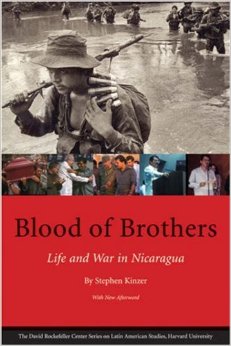Blood of brothers : life and war in Nicaragua
Stephen Kinzer was Istanbul bureau chief for "The New York Times" from 1996 to 2000. He is the author of many books, including "All the Shah's Men" and "Overthrow," He lives in Chicago
ARRIVAL 13
GUN THE BANDITS DOWN 23
A NATION REBELS 35
By the former New York Times Managua bureau chief, this is a well-written, information-rich survey of modern Nicaragua. Kinzer describes how Cesar Sandino's 1927-33 anti-U.S. campaign shaped the country's political development and inspired the overthrow of the Somoza regime in 1979. He analyzes the Reagan administration's "secret war" against the Sandinistas, and the deception that the contras existed only to interdict arms shipments to El Salvador. Kinzer relates many personal stories of his interaction with Nicaraguans, and he includes the exciting tale of his on-the-spot discovery of a U.S.-supplied contra camp in Honduras--a front-page scoop. He traces the confrontation between the Catholic church and the junta, the peace initiative by Costa Rica's Oscar Arias, the negotiated settlement that more or less ended the conflict and the surprising electoral victory of Violeta Chamorro over Daniel Ortega in 1990. Kinzer concludes that the Sandinistas grossly underestimated the moral power of the Catholic bishops, that they lost significant support by mistreating the Miskito Indians, and that they mistakenly believed they could build a prosperous Nicaragua "without deferring to the principle of free enterprise." Photos.
Copyright 1991 Reed Business Information, Inc. --This text refers to an out of print or unavailable edition of this title. From Library Journal
Kinzer served in Central America first in the 1970s as a freelance journalist and later as a New York Times bureau chief in Managua (1983-89). An eyewitness to events, he interviewed members of the Somoza, Sandinista, and contra hierarchies. As a result, he provides a highly objective and balanced assessment of events that led to the fall of the Somoza government in 1979. Kinzer avoids ideological bias, but he does note that the Sandinistas came to power because "those most likely to shed blood are the most likely to triumph." Yet despite their many shortcomings, he concludes "the Sandinistas at least provided a basis upon which a genuine democracy could be built." An example of public affairs journalism at its best, his book will stand as the definitive study of Nicaragua in the turbulent 1980s. It belongs in every public and school library.
- J.A. Rhodes, Luther Coll., Decorah, Ia.
Copyright 1991 Reed Business Information, Inc. --This text refers to an out of print or unavailable edition of this title.



